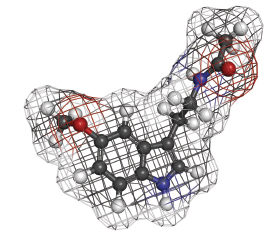
The ASCO Post’s Integrative Oncology series is intended to facilitate the availability of evidence-based information on integrative and complementary therapies commonly used by patients with cancer. In this installment, Ting Bao, MD, DABMA, MS, and Jyothirmai Gubili, MS, present information on melatonin, a pineal gland hormone that regulates circadian rhythms and sleep, among other functions.
Scientific Name: N-acetyl-methoxytryptamine
Overview
Produced endogenously by the pineal gland, melatonin is a pleiotropic hormone that plays an important physiologic role. It regulates circadian rhythms, sleep, mood, and aging; it may also be involved in the development of neurodegenerative diseases including Alzheimer’s and Parkinson’s. Melatonin is synthesized and released after the onset of darkness while being inhibited by light.
Current data show its utility in promoting sleep. Preliminary findings also suggest that melatonin may help improve quality of life in patients with cancer. More investigations are underway.
Supplemental melatonin is used as a sleep aid, marketed in the form of liquid, capsules, tablets, and as transdermal patches and for sublingual use. The prolonged-release forms of melatonin are also available.
The Science
Preliminary findings suggest the effectiveness of melatonin in reducing sleep latency and in improving sleep duration,1-3 although data from randomized trials are inconclusive.4-6 And a meta-analysis did not find any significant effects of melatonin on secondary sleep problems.7 But melatonin has been reported to alleviate anxiety8 and pain resulting from surgery9 and to reduce the frequency of migraine attacks.10 Melatonin may also help improve cognitive function and sleep maintenance in patients with Alzheimer’s disease.11 Studies in a pediatric population found melatonin useful in improving sleep-onset latency and disease severity in those with atopic dermatitis12; and comparable in effectiveness to midazolam in alleviating anxiety in children undergoing surgery.13
Melatonin has been investigated for potential anticancer effects as well. It demonstrated antioxidant14,15 and antiproliferative effects,16 in addition to exhibiting synergy with anticancer agents.17-19 Findings from small studies suggest the effectiveness of melatonin as monotherapy or in combination with other agents in improving the quality of life of patients with metastatic solid tumors,20-23 although similar effects were not observed in cachectic cancer patients.24
Interestingly, despite reports of association between melatonin and estrogen,25 short-term (4 months), low-dose (3 mg) supplementation in postmenopausal breast cancer survivors did not affect estradiol levels.26 However, a case report suggests that oral melatonin may delay menopause in premenopausal women by modulating levels of follicle-stimulating hormone and estrogen.27 Further studies are needed to resolve this ambiguity.
Mechanistic studies indicate that the G-protein–coupled receptors MT1 and MT2 are involved in mediating the circadian-resetting effects of melatonin.28 Melatonin also acts a potent free-radical scavenger14,29 and enhances antioxidative enzyme activities,15 interacting with cytosolic calmodulin and stimulating the production of interleukin (IL-4) in bone marrow T lymphocytes.30 The effects of melatonin on tumor cell growth may be mediated in part by melatonin receptor signaling.31,32 In endometrial cancer cells, it interferes with estrogen receptor expression.33 Other studies suggest that melatonin behaves both as a selective estrogen receptor modulator and an aromatase inhibitor.34,35 In addition, reduction in breast cancer metastasis is thought to be due to melatonin modulation of Rho-associated kinase protein 1 expression.36
Adverse Reactions
Melatonin use has been associated with drowsiness, alterations in sleep patterns, altered mental status, disorientation, tachycardia, flushing, pruritus, abdominal cramps, headaches, trouble sleeping, bad dreams, and hypothermia.1,26,30,37,38
Herb-Drug Interactions
Nifedipine: Concurrent administration with melatonin resulted in elevated blood pressure and heart rate.39
Cytochrome P4501A2 substrates: Melatonin was shown to inhibit CYP1A2 and may increase the bioavailability of substrate drugs, such as fluvoxamine.40-42
Anticoagulants: Melatonin, taken orally, has been associated with reduced plasma levels of factor VIII and fibrinogen.43 Therefore, it may increase the risk of bleeding when used along with anticoagulants.
Summary
Melatonin may help improve sleep quality and other patient-reported outcomes in patients with cancer. It is being investigated for potential anticancer effects, but solid evidence has yet to be generated. Reported to be a selective estrogen receptor modulator and an aromatase inhibitor, melatonin may affect estrogen levels in premenopausal women. Further studies need to be conducted to evaluate the long-term safety and efficacy of using melatonin in cancer survivors, especially those with hormone-sensitive tumors. ■
DISCLOSURE: Dr. Bao and Ms. Gubili reported no conflicts of interest.

Ting Bao, MD, DABMA, MS

Jyothirmai Gubili, MS
Dr. Bao is Director, Integrative Breast Oncology, Memorial Sloan Kettering Cancer Center, New York. Ms. Gubili is Editor, Integrative Medicine, Memorial Sloan Kettering Cancer Center, New York.
REFERENCES
1. Avery D, Lenz M, Landis C: Guidelines for prescribing melatonin. Ann Med 30:122-130, 1998.
2. Riemersma-van der Lek RF, Swaab DF, Twisk J, et al: Effect of bright light and melatonin on cognitive and noncognitive function in elderly residents of group care facilities: A randomized controlled trial. JAMA 299:2642-2655, 2008.
3. Wade AG, Ford I, Crawford G, et al: Efficacy of prolonged release melatonin in insomnia patients aged 55-80 years: Quality of sleep and next-day alertness outcomes. Curr Med Res Opin 23:2597-2605, 2007.
4. Gögenur I, Kücükakin B, Bisgaard T, et al: The effect of melatonin on sleep quality after laparoscopic cholecystectomy: A randomized, placebo-controlled trial. Anesth Analg 108:1152-1156, 2009.
5. Garzón C, Guerrero JM, Aramburu O, et al: Effect of melatonin administration on sleep, behavioral disorders and hypnotic drug discontinuation in the elderly: A randomized, double-blind, placebo-controlled study. Aging Clin Exp Res 21:38-42, 2009.
6. Gehrman PR, Connor DJ, Martin JL, et al: Melatonin fails to improve sleep or agitation in double-blind randomized placebo-controlled trial of institutionalized patients with Alzheimer disease. Am J Geriatr Psychiatry 17:166-169, 2009.
7. Buscemi N, Vandermeer B, Hooton N, et al: Efficacy and safety of exogenous melatonin for secondary sleep disorders and sleep disorders accompanying sleep restriction: Meta-analysis. BMJ 332:385-393, 2006.
8. Yousaf F, Seet E, Venkatraghavan L, et al: Efficacy and safety of melatonin as an anxiolytic and analgesic in the perioperative period: A qualitative systematic review of randomized trials. Anesthesiology 113:968-976, 2010.
9. Caumo W, Levandovski R, Hidalgo MP: Preoperative anxiolytic effect of melatonin and clonidine on postoperative pain and morphine consumption in patients undergoing abdominal hysterectomy: A double-blind, randomized, placebo-controlled study. J Pain 10:100-108, 2009.
10. Peres MF, Zukerman E, da Cunha Tanuri F, et al: Melatonin, 3 mg, is effective for migraine prevention. Neurology 63:757, 2004.
11. Wade AG, Farmer M, Harari G, et al: Add-on prolonged-release melatonin for cognitive function and sleep in mild to moderate Alzheimer’s disease: A 6-month, randomized, placebo-controlled, multicenter trial. Clin Interv Aging 9:947-961, 2014.
12. Chang YS, Lin MH, Lee JH, et al: Melatonin supplementation for children with atopic dermatitis and sleep disturbance: A randomized clinical trial. JAMA Pediatr 170:35-42, 2016.
13. Impellizzeri P, Vinci E, Gugliandolo MC, et al: Premedication with melatonin vs midazolam: Efficacy on anxiety and compliance in paediatric surgical patients. Eur J Pediatr 176:947-953, 2017.
14. Reiter RJ, Tan DX, Manchester LC, et al: Biochemical reactivity of melatonin with reactive oxygen and nitrogen species: A review of the evidence. Cell Biochem Biophys 34:237-256, 2001.
15. Zwirska-Korczala K, Jochem J, Adamczyk-Sowa M, et al: Influence of melatonin on cell proliferation, antioxidative enzyme activities and lipid peroxidation in 3T3-L1 preadipocytes—An in vitro study. J Physiol Pharmacol 56(suppl 6):91-99, 2005.
16. Squecco R, Tani A, Zecchi-Orlandini S, et al: Melatonin affects voltage-dependent calcium and potassium currents in MCF-7 cell line cultured either in growth or differentiation medium. Eur J Pharmacol 758:40-52, 2015.
17. Cos S, Garcia-Bolado A, Sánchez-Barceló EJ: Direct antiproliferative effects of melatonin on two metastatic cell sublines of mouse melanoma (B16BL6 and PG19). Melanoma Res 11:197-201, 2001.
18. Gao Y, Xiao X, Zhang C, et al: Melatonin synergizes the chemotherapeutic effect of 5-fluorouracil in colon cancer by suppressing PI3K/AKT and NF-κB/iNOS signaling pathways. J Pineal Res 62:jpi.12380, 2017.
19. Ruiz-Rabelo J, Vázquez R, Arjona A, et al: Improvement of capecitabine antitumoral activity by melatonin in pancreatic cancer. Pancreas 40:410-414, 2011.
20. Lissoni P, Barni S, Ardizzoia A, et al: A randomized study with the pineal hormone melatonin versus supportive care alone in patients with brain metastases due to solid neoplasms. Cancer 73:699-701, 1994.
21. Lissoni P, Chilelli M, Villa S, et al: Five years survival in metastatic non-small cell lung cancer patients treated with chemotherapy alone or chemotherapy and melatonin: A randomized trial. J Pineal Res 35:12-15, 2003.
22. Lissoni P, Paolorossi F, Tancini G, et al: A phase II study of tamoxifen plus melatonin in metastatic solid tumour patients. Br J Cancer 74:1466-1468, 1996.
23. Lissoni P, Brivio F, Fumagalli L, et al: Neuroimmunomodulation in medical oncology: Application of psychoneuroimmunology with subcutaneous low-dose IL-2 and the pineal hormone melatonin in patients with untreatable metastatic solid tumors. Anticancer Res 28:1377-1381, 2008.
24. Del Fabbro E, Dev R, Hui D, et al: Effects of melatonin on appetite and other symptoms in patients with advanced cancer and cachexia: A double-blind placebo-controlled trial. J Clin Oncol 31:1271-1276, 2013.
25. Pawlikowski M, Kolomecka M, Wojtczak A, et al: Effects of six months melatonin treatment on sleep quality and serum concentrations of estradiol, cortisol, dehydroepiandrosterone sulfate, and somatomedin C in elderly women. Neuro Endocrinol Lett 23(suppl 1):17-19, 2002.
26. Schernhammer ES, Giobbie-Hurder A, Gantman K, et al: A randomized controlled trial of oral melatonin supplementation and breast cancer biomarkers. Cancer Causes Control 23:609-616, 2012.
27. Diaz BL, Llaneza PC: Endocrine regulation of the course of menopause by oral melatonin: First case report. Menopause 15:388-392, 2008.
28. Dubocovich ML: Melatonin receptors: Role on sleep and circadian rhythm regulation. Sleep Med 8(suppl 3):34-42, 2007.
29. Karbownik M, Reiter RJ: Antioxidative effects of melatonin in protection against cellular damage caused by ionizing radiation. Proc Soc Exp Biol Med 225:9-22, 2000.
30. Brzezinski A: Melatonin in humans. N Engl J Med 336:186-195, 1997.
31. Ram PT, Dai J, Yuan L, et al: Involvement of the mt1 melatonin receptor in human breast cancer. Cancer Lett 179:141-150, 2002.
32. Shiu SY, Law IC, Lau KW, et al: Melatonin slowed the early biochemical progression of hormone-refractory prostate cancer in a patient whose prostate tumor tissue expressed MT1 receptor subtype. J Pineal Res 35:177-182, 2003.
33. Watanabe M, Kobayashi Y, Takahashi N, et al: Expression of melatonin receptor (MT1) and interaction between melatonin and estrogen in endometrial cancer cell line. J Obstet Gynaecol Res 34:567-573, 2008.
34. Cos S, Sánchez-Barceló EJ: Melatonin and mammary pathological growth. Front Neuroendocrinol 21:133-170, 2000.
35. Cos S, Sánchez-Barceló EJ: Melatonin, experimental basis for a possible application in breast cancer prevention and treatment. Histol Histopathol 15:637-647, 2000.
36. Borin TF, Arbab AS, Gelaleti GB, et al: Melatonin decreases breast cancer metastasis by modulating Rho-associated kinase protein-1 expression. J Pineal Res 60:3-15, 2016.
37. Sack RL, Lewy AJ, Hughes RJ: Use of melatonin for sleep and circadian rhythm disorders. Ann Med 30:115-121, 1998.
38. Shamir E, Barak Y, Shalman I, et al: Melatonin treatment for tardive dyskinesia: A double-blind, placebo-controlled, crossover study. Arch Gen Psychiatry 58:1049-1052, 2001.
39. Lusardi P, Piazza E, Fogari R: Cardiovascular effects of melatonin in hypertensive patients well controlled by nifedipine: A 24-hour study. Br J Clin Pharmacol 49:423-427, 2000.
40. Härtter S, Grözinger M, Weigmann H, et al: Increased bioavailability of oral melatonin after fluvoxamine coadministration. Clin Pharmacol Ther 67:1-6, 2000.
41. von Bahr C, Ursing C, Yasui N, et al: Fluvoxamine but not citalopram increases serum melatonin in healthy subjects—An indication that cytochrome P450 CYP1A2 and CYP2C19 hydroxylate melatonin. Eur J Clin Pharmacol 56:123-127, 2000.
42. Chang TK, Chen J, Yang G, et al: Inhibition of procarcinogen-bioactivating human CYP1A1, CYP1A2 and CYP1B1 enzymes by melatonin. J Pineal Res 48:55-64, 2010.
43. Wirtz PH, Spillmann M, Bärtschi C, et al: Oral melatonin reduces blood coagulation activity: A placebo-controlled study in healthy young men. J Pineal Res 44:127-133, 2008.
Learn More About Herbs, Botanicals, & Other Products
Visit the free About Herbs website at www.mskcc.org/cancer-care/integrative-medicine/herbs/melatonin

